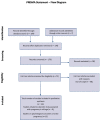Advanced Maternal Age: A Scoping Review about the Psychological Impact on Mothers, Infants, and Their Relationship
- PMID: 38540450
- PMCID: PMC10968301
- DOI: 10.3390/bs14030147
Advanced Maternal Age: A Scoping Review about the Psychological Impact on Mothers, Infants, and Their Relationship
Abstract
The mean age at childbirth in Europe has gradually increased, and it is now around 29 years of age. It has been shown that older maternal age is associated with problems of fertility; in fact, with increasing age, the chance of conceiving diminishes, and fetal and obstetric complications grow. Research has focused particularly on the biological risks associated with late pregnancy, both for the child and the woman. Less space has been dedicated to the potential psychological and relational benefits of motherhood at an advanced age. The aim of this review was to summarize the existing literature on this issue. Qualitative and quantitative studies were sourced from Pubmed, Science Direct, PsycINFO, and SciELO. The selected works highlight that advanced maternal age can be associated with some advantages for both mothers and their offspring in terms of physical healthcare, parenting styles, and child developmental outcomes. Specifically, the review suggests that older mothers have greater emotional maturity and feel more prepared for motherhood; also, advanced maternal age appears to exert a protective influence on children's behavioral, social, and emotional functioning, compensating for the biological risks.
Keywords: advanced maternal age; maternal mental health; perinatality; pregnancy outcomes; protective factors.
Conflict of interest statement
The authors declare that they have no conflicts of interest.
Similar articles
-
Building a family at advanced parental age: a systematic review on the risks and opportunities for parents and their offspring.Hum Reprod Open. 2023 Nov 15;2023(4):hoad042. doi: 10.1093/hropen/hoad042. eCollection 2023. Hum Reprod Open. 2023. PMID: 38045093 Free PMC article. Review.
-
The health consequences of teenage fertility.Fam Plann Perspect. 1985 May-Jun;17(3):132-9. Fam Plann Perspect. 1985. PMID: 2431924
-
Psychological and physical intimate partner violence and young children's mental health: The role of maternal posttraumatic stress symptoms and parenting behaviors.Child Abuse Negl. 2018 Mar;77:168-179. doi: 10.1016/j.chiabu.2018.01.012. Epub 2018 Jan 19. Child Abuse Negl. 2018. PMID: 29358121 Free PMC article.
-
Adolescent parenting: outcomes and maternal perceptions.J Obstet Gynecol Neonatal Nurs. 1995 Oct;24(8):713-8. doi: 10.1111/j.1552-6909.1995.tb02555.x. J Obstet Gynecol Neonatal Nurs. 1995. PMID: 8551369
-
[Motherhood at the Age of 35 and Over: The Risk of Advanced Maternal Age as Perceived by Women - a Literature Study].Z Geburtshilfe Neonatol. 2017 Jun;221(3):111-121. doi: 10.1055/s-0043-104864. Epub 2017 Jun 30. Z Geburtshilfe Neonatol. 2017. PMID: 28666302 Review. German.
Cited by
-
Factors associated with postpartum fatigue: an exploration of the moderating role of resilience.Front Public Health. 2024 Jun 14;12:1394380. doi: 10.3389/fpubh.2024.1394380. eCollection 2024. Front Public Health. 2024. PMID: 38947349 Free PMC article.
-
Geographic disparities and determinants of full utilization of the continuum of maternal and newborn healthcare services in rural India.BMC Public Health. 2024 Dec 5;24(1):3378. doi: 10.1186/s12889-024-20714-3. BMC Public Health. 2024. PMID: 39639301 Free PMC article.
-
Screen-Related Parenting Practices in Mexican American Families with Toddlers: Development of Culturally- and Contextually-Relevant Scales.Children (Basel). 2025 Jul 2;12(7):874. doi: 10.3390/children12070874. Children (Basel). 2025. PMID: 40723067 Free PMC article.
-
Exploring and comparing the relationship between maternal anxiety and children's anxiety during admission, hospitalization, and discharge in pediatric wards of Iranian hospitals.BMC Psychol. 2024 Nov 14;12(1):657. doi: 10.1186/s40359-024-02154-1. BMC Psychol. 2024. PMID: 39543703 Free PMC article.
References
-
- Hadfield L. Motherhood, choice and the British media: A time to reflect. Gend. Educ. 2007;19:255–263. doi: 10.1080/09540250601166100. - DOI
-
- Jefferies J. Fertility assumptions for the 2006-based national population projections. Popul. Trends. 2008;131:19–27. - PubMed
-
- Eurostat—Demography 2023 Edition—Older Mothers. [(accessed on 12 October 2023)]. Available online: https://ec.europa.eu/eurostat/web/interactive-publications/demography-20....
Publication types
LinkOut - more resources
Full Text Sources


